- Home
- Michael Crichton
Dealing or The Berkeley-to-Boston Forty-Brick Lost-Bag Blues Page 17
Dealing or The Berkeley-to-Boston Forty-Brick Lost-Bag Blues Read online
Page 17
John and Sandra wouldn’t dig Herbie’s blood all over the apartment, but that was just too bad for now. I threw the sack of dope inside, then helped Herbie down the hallway to the bedroom. He was groaning softly, and covered with sweat.
“Easy now, easy,” I said, helping him down onto the bed. “Let’s get your jacket off.” He moaned as I removed it, his face contorted; with the jacket off, I got him onto his stomach and pulled out his shirt, which I then tore straight up the back to see how bad the wound was.
And stopped.
For a flash I was puzzled, and then I began to get pissed. Fucking Herbie. “Where does it hurt, man?”
“Oh … oh … in the middle … right shoulder … around the scap … scapula.”
“Yes,” I said. “I see.” What I saw was a smooth, slightly flabby, white expanse of unbroken skin. “Doesn’t look too bad, though. Here, you better see for yourself. Go look in the mirror.”
“Okay,” Herbie said, doing the heavy number. With a wince he said, “Give me a hand up, Pete, buddy.”
“Sure.” I whipped him off the bed with one hand and watched in silence as he staggered to his feet and walked into the bathroom. The bathroom light went on, and there was a long silence.
Finally, quietly, came an awed voice: “Far out.”
There then followed another long silence, in which I lit a cigarette, smoked it, and tried to keep from going in and plugging the little bastard myself. After a while, I heard him say, “Most perplexing.” And then, finally, he came back into the bedroom.
“I know what you’re thinking,” Herbie said. He was being very dignified and composed. “And I apologize for being an alarmist.” And then he walked out of the room.
“Hey, where’re you going?” I went out into the hallway after him, and found him returning with the sack. He walked toward the kitchen, and as he passed me, he said, “I think we’d better count the bricks, don’t you?”
He had made a fast recovery, and I told him so. He didn’t say anything in response. Out in the kitchen, he began to count the bricks while I raided Sandra’s refrigerator. Sandra is a candy freak. Every kind of American, Italian, French, Spanish, Swiss, Indonesian, Japanese candy can be found in her refrigerator. While I was looking, I said, “How many bricks?”
“What?” Preoccupied voice.
“How many bricks?”
“C’mere and dig this, Peter.”
I turned around to look. He was holding the sack in front of him. At first I saw nothing. Then, to demonstrate, he stuck his finger into the neat little hole.
“Interesting?” he said. He then picked up one of the bricks, and cut it open with a knife before I could protest. There was a piece of dull gray metal imbedded in the brick.
I went over and plucked it out. “Far out,” I said.
“The bag was over my right shoulder,” Herbie said.
“Far out,” I said again.
“I believe you owe me an apology,” Herbie said.
And then I began to laugh. “I owe you more than that,” I said. “I owe you the biggest smoke of your life.” I got a piece of newspaper and tore off a quarter, and pulled off a chunk of brick and began to roll it into a joint.
As Herbie watched, he said with a small smile, “All in all, it was pretty exciting, wasn’t it?”
An hour later, we were still in the kitchen, drafting the statement. We were both very stoned and very happy. I was writing and Herbie was dictating. I said, “How about ‘Please release her tomorrow morning’?”
“No,” Herbie said. “Make it strong. ‘I want her released tomorrow morning’—and then put in the D.A. and the Globe and all that.”
I nodded, and made the changes.
“Is that it?” Herbie said.
“That’s it,” I said, and picked up the phone to call. The first three times I dialed, I got the siren whine of a nonexistent number. Finally, the fourth time, it began to ring. I was very, very stoned.
A woman’s voice: “Hello?”
I said, “Lieutenant Murphy, please. This is Captain Fry of the Narcotics Division.”
“Just a minute, Captain.”
A long silence at the other end of the phone, presumably while Murphy tried to figure out who the hell Captain Fry was—or who would be calling saying he was Captain Fry. Or what Captain Fry would want at this time of night, if indeed there really were a Captain Fry, whom he had never heard of … God, I was zonked.
Finally: “Murphy here.”
I jumped at the sound of his voice, the familiarity of it. For a moment I flashed back to Alameda County and the interrogation room, the kneeing, the whole riff. Then I got hold of myself. “Yes,” I said. “This is a mutual acquaintance. I thought you would appreciate knowing that I have acquired twelve kilograms of marijuana that have an interesting set of fingerprints on them.”
“Who is this?”
“The kilograms are stamped with a peace symbol and the numbers eight nine oh, which allows their California origin to be quite reliably established. The fingerprints,” I continued, “are yours and Susan Blake’s. That is an interesting combination. It is easy to explain how that combination of fingerprints got there. But I wonder, is it possible to explain how they came into my hands?”
“Who’s calling?” Murphy said, his voice tense.
“I think that a lot of people would be curious enough to be interested in my explanation,” I said. “I have one very curious acquaintance in the district attorney’s office, and another at the Boston Globe.”
There was a long, taut silence. Murphy was thinking it over. And he was going to play it our way, I knew. He had no choice. He’d have to drop charges on Sukie.
“What do you want?” he said, finally.
“I want the girl released and all charges dropped.”
There was a long, slow sigh at the other end. The bastard obviously wasn’t used to having other people play as rough as he did. Finally he cleared his throat.
“Now you listen to me, punk, and listen good. You can’t touch me, you can’t even rile me. You go near the D.A.’s office with those bricks and I’ll see to it personally that you get busted. Now. As far as I’m concerned, you can go right ahead and do anything you want. I’m going back to bed.” Click!
Herbie had been sitting across the table from me. He must have seen my face fall. “What happened?” he said.
I couldn’t believe it. I was shaking my head, absolutely not believing it. “He didn’t go for it,” I said.
49
I WAS SUDDENLY GHASTLY SOBER, the kind of sober where the room lights seem brighter and the shadows sharper and everything is a little bit uglier. I got up and poured myself a Scotch—some of John’s Chivas this time, the hell with him. I felt it slosh down in my stomach over the Perugina chocolate, and I thought about Speedy shooting at us, and I began to feel sick. I spent a few hours standing there, leaning against the wall, trying to decide whether I would make it or not, and finally decided I wouldn’t. I jumped for the sink.
“Flawless,” Herbie said.
I turned and looked back at him. The world was green. “Thanks,” I said.
“I meant the plan,” Herbie said, ignoring me as I wiped my mouth with a towel. He ticked the points off on his fingers. “Murphy is fronting bricks. His prints are on them. We recover the fronted bricks. We threaten to expose him unless he releases the girl. He releases the girl. We expose him anyway. A flawless plan.”
“It didn’t work,” I said again. “You can’t bust pigs, no matter how fucked-up they are.”
Herbie nodded in a puzzled way. “He must have protection,” he said. “That’s the only answer.”
I laughed, and as I did the green world shifted back to glaring white. “Uh-uh,” I said. “He doesn’t give a crap, that’s all. He knows that a couple of punk kids are trying to rip him off, and he doesn’t mind a bit. He knows they can’t touch him. The day when freaks bust wrong pigs is the day that—”
“I find that diffic
ult to believe,” Herbie said, sounding for all the world like my old man.
“Yeah, well, that’s what’s happening.” I was beginning to see what it meant, from Murphy’s viewpoint, to be hassled by a couple of kids. And I began to see just how little power we had. Nobody ever had power unless someone gave it to them. Murphy wasn’t giving us an inch.
“Maybe he doesn’t think we can do it,” Herbie said.
“Maybe we can’t,” I said. It had all been an enormous bluff. We didn’t know anybody on the newspapers, or at the D.A.’s office. We didn’t know anybody, period.
John chose that happy moment to walk in with Sandra. She ran for the John, and he came into the kitchen, sniffing the air. “Jesus, it stinks in here.” He walked over to the sink, took a look, and shook his head. “Harkness, you never could—”
“And you couldn’t either,” I said. “Get bent, or get lost, or preferably both.”
John paused to savor the atmosphere. “What’ve you dudes been up to?”
“The impossible,” Herbie said.
Then John saw the bricks on the kitchen table. His spirits rose. “My, my, what have we here?”
Nobody said anything.
“Fine stuff,” he said, crumbling a bit between his fingers. “Almost as good as—” He stopped, looked at another brick, at the stamp on the wrapper. “Where’d you pick this up?”
He looked over at me. I didn’t say anything. So he looked over at Herbie. “Three guesses,” Herbie said. John just stood there, totally out of it, and then Sandra walked in and began clucking about the smell. I was feeling a little sick again. John saw the bottle of Chivas out and began bitching about my drinking his stuff again. All I could think of was how we couldn’t touch Murphy. It didn’t seem possible that he was untouchable. It wasn’t possible. It couldn’t be possible.
“Herbie,” I said, “we can do it.”
“How’s that?” Herbie sounded bored.
“We could arrange a trade.”
“No!” He sat suddenly upright. “That ruins everything. The whole point of the plan—”
“I know,” I said. “But the flawless plan didn’t work. We already know that. The only thing we can do is trade.”
“You mean,” Herbie said, his mouth turning down in distaste, “give him the bricks?”
“Give who the bricks?” John said sharply. He had suddenly forgotten all about the Scotch.
“Yes,” I said. “Give them to him.”
“That’s nowhere,” Herbie said. “That’s greasing the wheels, playing right into the system. Greasing Murphy’s wheels.”
“What’s going on?” John demanded. He seemed almost frightened by not knowing what was going on. A power trip that he wasn’t part of. Frightening.
“We’d be playing right into it anyway,” I said, “if we tried to buy her off on Monday.”
“It’s not the same,” Herbie said. “You got to believe in justice sometime. You got to believe that if this stuff went to the papers, and the district attorney—”
“No,” I said. I didn’t believe it. And for some reason, I remembered a conversation I’d once had with my father about Boston justice. I was telling him how Super Spade got busted, and then bought himself off. He refused to believe the story. I tried to make him believe it—believe that everyone in Boston, from the mayor to the garbage collectors, was crooked. “But think what that means, or would mean if it were true,” my father said. I had never thought about it. Not really. But I was thinking now.
“It won’t work,” Herbie said. “Even if he agrees, he’ll take the bricks and keep the chick anyway.”
“Maybe not,” I said.
“Maybe not,” Herbie mimicked. “You going to trust him?”
“Will somebody please tell me what the hell is going on here?” John shouted.
But by that time I was checking through Sandra’s silverware, plucking at the tines of her forks, trying to find one that sounded good. And when I finally did, I picked up the phone and dialed.
“You’re crazy,” Herbie said.
“Who’re you calling?” John said. His voice had a slight whine now, a very atypical voice for John. I began to see him differently.
This time, a male voice answered the phone directly. An irritable male: “Hello.”
“Lieutenant Murphy?” I said. I looked over at Herbie and John. John was beginning to get the picture. His mouth was open.
“Yeah.”
“Is this Lieutenant Murphy?” I said again.
“Yeah.”
“I’m calling with a business proposition and—”
“Not interested. Goodbye—”
“Wait,” I said. I had a flash of desperation. But the bastard waited. I could hear him breathing at the other end. “I’ve got twelve bricks here,” I said. “They were … borrowed from a gentleman in Boston. As you know, their market value is in the neighborhood of three thousand dollars. I’d like you to have them.”
“What for?” He was growling, but he was interested.
“All we want is the girl,” I said. “Drop charges and release her. We’ll get the twelve bricks to you.”
“That’s not good enough, sonny,” Murphy said. “Goodbye.”
By now, though, I knew he wasn’t going to hang up. “As a demonstration of faith,” I said, “we will arrange for you to receive four bricks tonight. You’ll get the rest on her release.”
“Six bricks,” Murphy said.
“Six bricks?” I said. “That seems an awful lot.”
“Six bricks,” Murphy said, “and not one less.”
“You’re not being very reasonable, Lieutenant Murphy,” I said. “But if you want six bricks, then …” and here I plucked the tines of the fork “… six it will be.”
“What was that?” Murphy said.
“Are we agreed on six bricks?” I said. And I plucked the tines once more. It didn’t make a very realistic sound, but then, it didn’t have to.
“What was that noise?”
“We’ll call you in an hour,” I said, “to tell you where you can collect the bricks. Is that satisfactory?”
“What was that noise?” But he knew damned well what the noise was, or thought he knew.
“We want you to be honest,” I said. “That’s just our way of keeping things up front. We’ll talk to you in an hour.” And I hung up.
Herbie was staring at me. “Far out,” he said.
John said, “What was the fork stuff?”
“Brilliant,” Herbie said, “brilliant. We can drop the bricks at the Museum of Science, and—”
“What was the fork?” John said.
I plucked it again, and listened to the brief twink it made. “Our tape recorder,” I said, and began to laugh.
50
“MURPHY’S FORKED HIMSELF,” Herbie laughed. I was laughing so hard there were tears in my eyes.
Only John wasn’t laughing. He was frowning and staring at the bricks. Then he frowned and stared at us. And finally he said, “He’ll still rip you off.”
“Who?” I said. “Murphy? After we taped him?”
“Yeah,” John said. He didn’t explain. He just sat back and watched us as we stopped laughing slowly, the laughs turning into coughs, and then silence.
“What do you mean?” Herbie said.
“I mean,” John said, “that Murphy is going to sit back and ask himself what kind of taping device makes a beeping noise. And he’s going to decide that only a commercial device does—like they use for telephone interviews on the news radios and stuff. And he’s going to decide that a bunch of snot-nosed kids don’t have a commercial device, that they have a kitchen fork and are trying to rip him off.”
I shook my head. “He’s not that smart.”
I looked over at Herbie for confirmation. Herbie was staring at his feet.
John said, “Murphy’ll take your six bricks, keep the girl, and figure out a way to bust you later on.”
“No way,” I said, and laughed. Bu
t John wasn’t laughing, and Herbie wasn’t laughing. And I began thinking about Murphy, and the interrogation room in San Francisco, and I began to think that maybe they were right on. Murphy was a pig—the pig.
I stood up. “All right,” I said. “The only way is to arrange a trade.”
John shook his head. “Who do you think you’re messing with, man?”
But by now I was thinking very fast, and seeing things clearly. Seeing how it could be done. I picked up the phone again.
“What’re you doing?” Herbie said.
I just dialed the number.
There is no building in Boston quite like South Station. It’ll be torn down soon for some new structure, but in the meantime, it is unique: giant, cavernous, dirty, and deserted. Especially at three o’clock in the morning. The faint smell of piss hung over everything—the dirty walls, the cracked wooden benches, the handful of sailors and derelicts who were sitting around.
I arrived by taxi and walked in the west entrance. It had once been pretty fashionable, with a broad metal overhead canopy leading through six swinging doors to the inside. Just back of the doors were rows of telephone booths. I paused at one to take down the number. Then I went back outside. There was a taxi rank lined up at the curb, the drivers sitting back in their cars, smoking cigarettes. I went to the first cab and said to the driver, “I want you to do me a favor.”
“Sure,” he said. “You and the President.”
I held out a ten-spot. He looked appeased. “What’s the story?”
“In half an hour,” I said, “a man will get into your taxi and say he is a police officer. Ask to see his identification. If he produces it, drive him to the Newton tolls. This should cover everything.” I wagged the ten dollar bill.

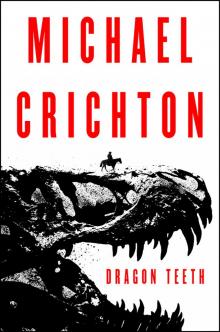 Dragon Teeth
Dragon Teeth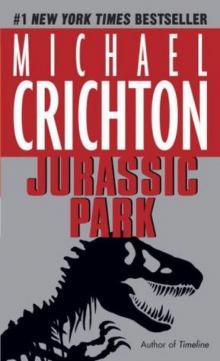 Jurassic Park
Jurassic Park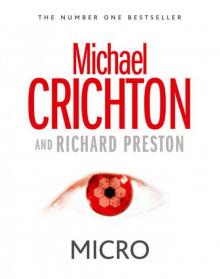 Micro
Micro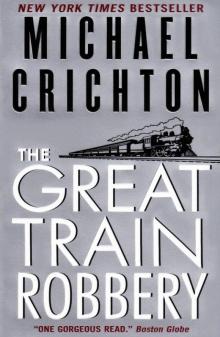 The Great Train Robbery
The Great Train Robbery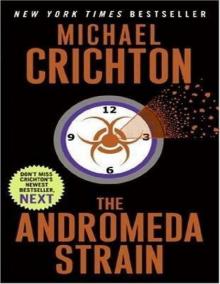 The Andromeda Strain
The Andromeda Strain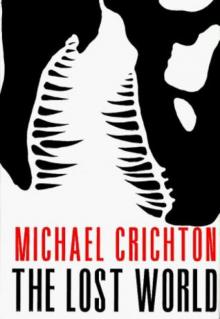 The Lost World
The Lost World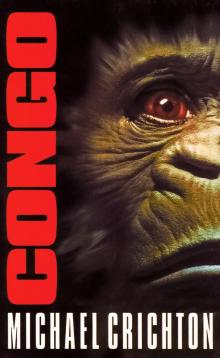 Congo
Congo Travels
Travels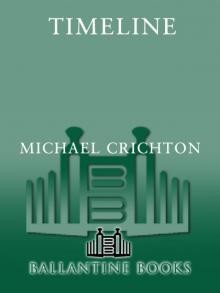 Timeline
Timeline Sphere
Sphere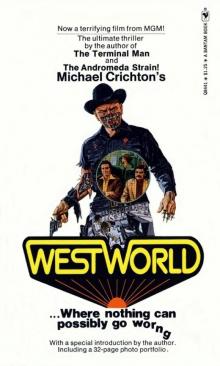 Westworld
Westworld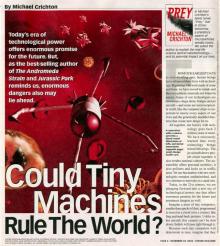 Prey
Prey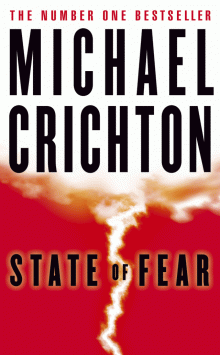 State Of Fear
State Of Fear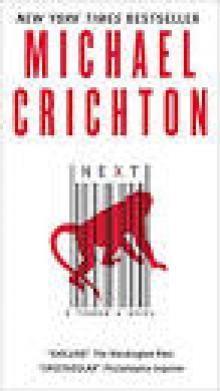 Next
Next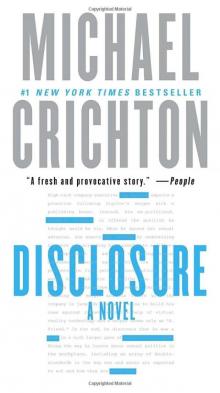 Disclosure
Disclosure Pirate Latitudes
Pirate Latitudes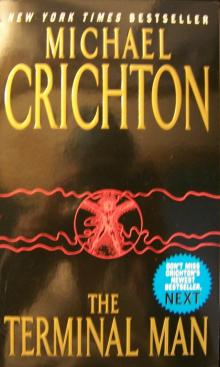 The Terminal Man
The Terminal Man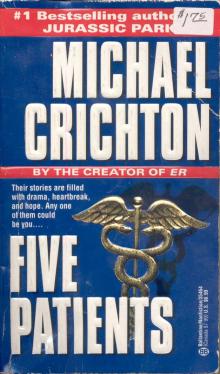 Five Patients
Five Patients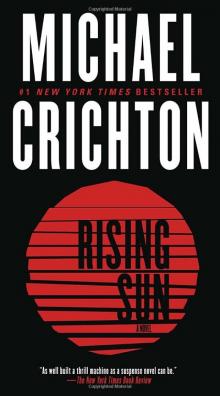 Rising Sun
Rising Sun Binary
Binary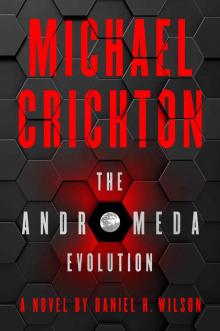 The Andromeda Evolution
The Andromeda Evolution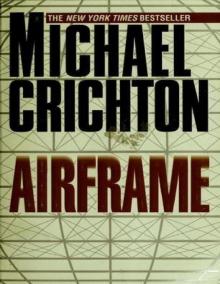 Airframe
Airframe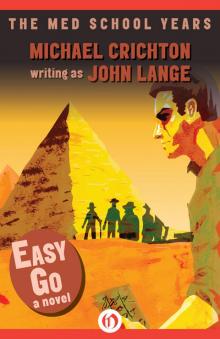 Easy Go
Easy Go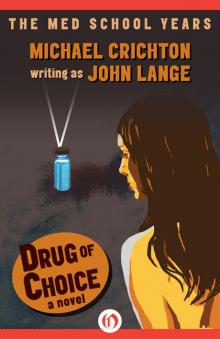 Drug of Choice
Drug of Choice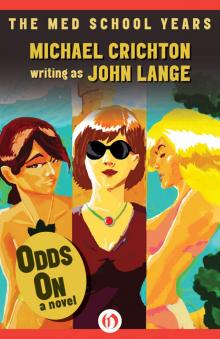 Odds On: A Novel
Odds On: A Novel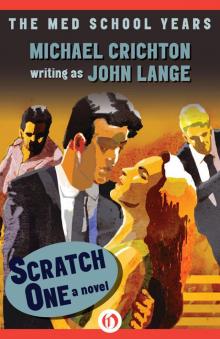 Scratch One
Scratch One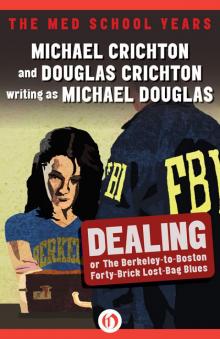 Dealing or The Berkeley-to-Boston Forty-Brick Lost-Bag Blues
Dealing or The Berkeley-to-Boston Forty-Brick Lost-Bag Blues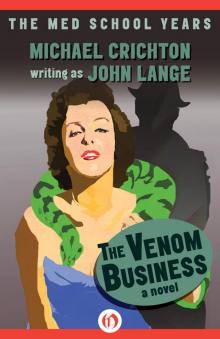 Venom Business
Venom Business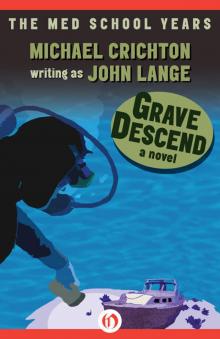 Grave Descend
Grave Descend Gold - Pirate Latitudes
Gold - Pirate Latitudes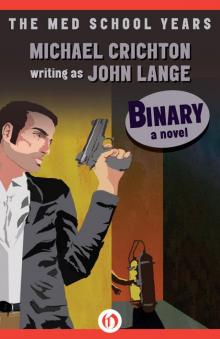 Binary: A Novel
Binary: A Novel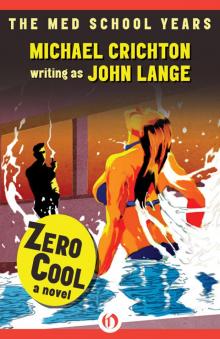 Zero Cool
Zero Cool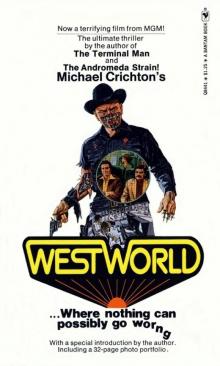 Delos 1 - Westworld
Delos 1 - Westworld